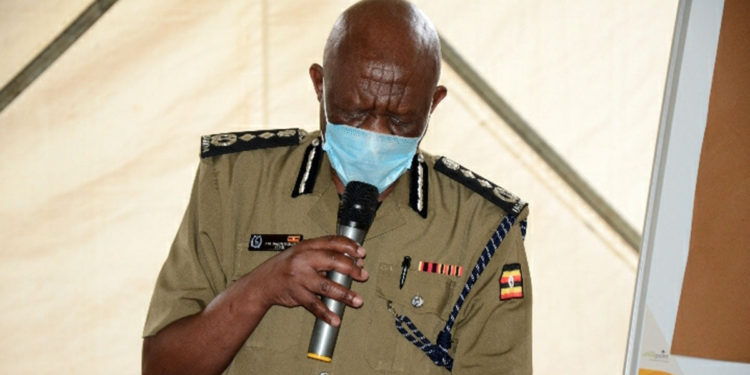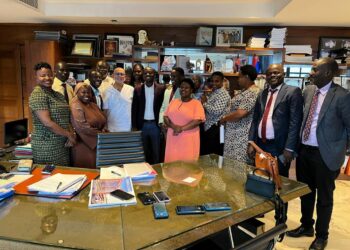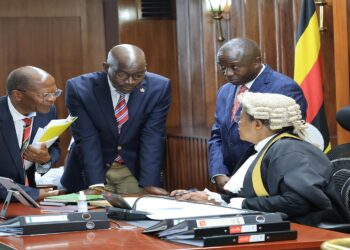In March this year, Parliament okayed the extension of Martin Okoth Ochola’s term as Inspector General of Police [IGP]. This means that the former IGP Edward Kale Kayihura’s deputy will have been at the helm of the Uganda Police Force for six years when his current term finally comes to an end in March 2024.
Despite succeeding Kayihura – the man who moved with pomp wherever he went, be it on duty or during his free time, Ochola has largely remained conspicuously hidden from public lenses.
It’s thus right to conclude that there has been, and still remains a lot that is still unknown about the man who has spent the largest part of his adult life serving the police force.
Career highlights in the force
He joined the Uganda Police Force in January 1988 and graduated at the rank of a Cadet Assistant Superintendent of Police [ASP]. In February 1989, he was posted to Entebbe International Airport as the officer-in-charge[OC] of the Airport Security.
This was followed by stints at Entebbe Police Station and Buganda Road Court, where he remained for three years. He was then posted to police headquarters as the acting assistant commissioner of police in the legal department.
He was promoted to superintendent of police and later to senior superintendent of police in a quick succession.
In May 2001, Ochola was appointed the deputy director of criminal investigations and remained in that position for seven years. In 2008, he was promoted to commissioner of police.
That same year, he was confirmed as director CID. In 2009, he was promoted to the rank of Assistant Inspector General of Police.
In August 2011, President Yoweri Museveni appointed him the Deputy Inspector General of Police [D/IGP], deputizing Kale Kayihura until 4 March 2018, when he replaced him as the new IGP.
As police Chief, Ochola has won the hearts of many of his subordinates due to his professional approach in execution of his duties. A source close to the veteran police chief told this news website that the IGP is one person who will not compromise the Institution’s professionalism at any cost.
Since the start of his IGP tenure at the policing institution, appointments moved away from technical know who to merit and qualification. He has hatched a culture of getting the right deployment for the right jobs and this has reinstated harmony in the force.
In the same vein, Ochola is said to harbor zero tolerance to corruption. His uncompromising demand for accountability from senior managers has earned him both admirers and haters in equal measures.
What has however made him most appealing to his subordinates is his shyness in the eyes of unnecessary publicity. In spite of the fact that his immediate predecessor- Kayihura was a man of swagger and a darling of the public lenses, Ochola opted for a life of humility.
He has adopted a culture of delegating most of the work and himself retaining an overseer role. This has in turn allowed the culture of human resource development to blossom in the Naguru headquartered establishment.
In his private life, Ochola has equally maintained a largely humble style of living. Upon his appointment as IGP, he rejected the offer to shift into the new house he is entitled to in the new capacity. Adamantly, he reasoned that he saw no reason as to why he would get himself in a luxurious mansion yet a few years later, he would retire and return to his life. This, he claimed was destined to disorganise him. Despite efforts to convince him, he refused to move.
Then came another scenario. The force needed to refurbish his personal home to a standard befitting of an IGP. A Chinese furniture firm was contracted to do the job. After some work had been completed, it came to replace his old chairs with new and improved ones. He stopped the procurement process on the grounds that he still felt they were good enough for him and thus saw no reason to dispose of them. He insisted this would tantamount to careless expenditure of police funds.
A source also intimated to us that at one point, his son who had just completed school approached his father – Ochola for a recommendation for a certain job. As IGP, the son strongly believed his father would be able to sway the tides in his favor at his prospecting workplace. To his shock however, the maverick police police chief refused. He told him this would be “influence peddling” something he believed was wrong. He needed the boy to struggle on his own, something he believed could facilitate his growth as a person.
He also shunned away from using the police helicopter which used to be identified with his former boss Kale Kayihura. This, Ochola suggests, would cause unnecessary expenses to the force.
We have since learned that Ochola has since been convinced to build a retirement house befitting of someone that has served as police Chief. It is near completion in Mukono Municipality.
These, and many more virtues explain how and why the humble policeman has managed to endear himself to many within the force and outside. It’s thus unsurprising the president specifically opted for him to spearhead the Police’s renaissance after Kayihura.
Do you have a story in your community or an opinion to share with us: Email us at editorial@watchdoguganda.com













